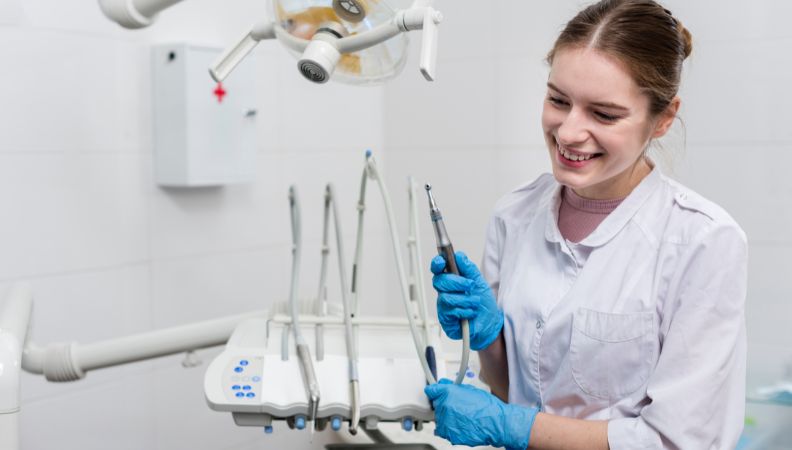Monday - Tuesday:9am - 6pm
Friday - Sunday:8am - 5pm
Sunday: Closed

If you’re exploring a career in healthcare but aren’t sure where to start, becoming a dental hygienist could be an ideal path for you. This rewarding profession combines healthcare, patient interaction, and the opportunity to make a significant impact on people’s overall health. Dental hygienists play a crucial role in maintaining oral health, preventing diseases, and educating patients on proper dental care. In this article, we’ll explore the essential duties, required qualifications, salary expectations, and career opportunities for dental hygienists. Whether you’re considering this career or just want to know more, this guide will give you all the information you need.
A dental hygienist is a licensed healthcare professional who specializes in preventive dental care. They work alongside dentists to ensure patients maintain optimal oral hygiene. Their daily responsibilities include cleaning teeth, examining patients for signs of oral diseases, and educating patients on proper brushing and flossing techniques. Hygienists also take X-rays, apply fluoride treatments, and may even administer local anesthesia in some cases.
In more detail:
These tasks are essential in preventing more severe oral health problems down the line, ensuring the long-term well-being of patients’ teeth and gums.
Becoming a dental hygienist requires a solid educational foundation, and there are specific steps you need to take to meet the necessary requirements.
Here are the three main educational steps in detail:
To begin, you need to enroll in an accredited dental hygiene program. These programs are typically offered at community colleges, universities, or vocational schools. The most common program length is two years for an associate degree in dental hygiene, but there are also four-year bachelor’s degree programs available for those interested in pursuing advanced roles in the field. The curriculum includes both classroom instruction and hands-on clinical training. You will learn about anatomy, dental materials, dental hygiene theory, and patient care techniques.
After completing an accredited dental hygiene program, you must pass national and sometimes regional licensing exams. The most commonly required exam is the National Board Dental Hygiene Examination (NBDHE), which tests your knowledge in areas like patient management, infection control, and clinical dental hygiene procedures. In addition, some states may require specific regional exams or additional certifications, such as an anesthesia certification. Obtaining licensure ensures that you meet the legal requirements to practice as a dental hygienist.
After becoming licensed, dental hygienists are required to complete continuing education (CE) courses regularly to maintain their licensure. This ensures that they stay up-to-date with the latest advancements in dental care and maintain proficiency in their skills. Additionally, some dental hygienists choose to pursue specializations in areas such as pediatric dentistry, periodontal care, or public health. Specializations often require additional coursework, exams, and certification, but they can open doors to higher-paying positions and career advancement.
The salary and job outlook for dental hygienists are two key factors that make this career attractive.
Here are three important details about the salary potential and job outlook for dental hygienists:
The average salary for dental hygienists varies based on experience, location, and level of education. According to the U.S. Bureau of Labor Statistics (BLS), the median annual wage for dental hygienists was approximately $77,000 in 2022. However, this figure can vary. For example, in some states or high-demand areas, experienced dental hygienists can earn $90,000 or more per year, especially if they have advanced certifications or work in specialized fields like periodontal care or pediatric dentistry.
Several factors influence the salary of a dental hygienist:
The job outlook for dental hygienists is strong. The profession is expected to grow by 6% from 2021 to 2031, which is faster than the average for other occupations.
This growth is driven by several factors:
Becoming a successful dental hygienist goes beyond completing education and obtaining licensure. It requires continuous improvement, a positive mindset, and strong interpersonal skills.
Here are the key strategies to thrive in this rewarding career:
One of the most important qualities of a successful dental hygienist is the ability to communicate effectively with patients. Since dental visits can be anxiety-inducing for many, having a calm, empathetic, and reassuring demeanor can make a significant difference in patient comfort and trust.
By building strong communication skills and creating a comfortable environment for patients, you can foster long-term relationships and boost patient satisfaction.
The dental field is constantly evolving with new technologies, treatments, and techniques. A successful dental hygienist must be committed to lifelong learning to stay on top of these advancements.
By continually learning and adapting to new developments, you can improve the quality of care you provide and stay competitive in your field.
Practice Good Ergonomics and Self-Care Dental hygiene is a physically demanding job that requires long hours of standing and performing intricate procedures. To have a successful, long-lasting career, it’s essential to practice proper ergonomics and take care of your physical health.
A dental hygienist cleans teeth, examines for oral diseases, educates patients on oral care, and assists dentists with procedures. They play a crucial role in preventing dental issues.
It typically takes two years to earn an associate degree in dental hygiene. Additional certifications or advanced degrees can take longer.
Yes! Dental hygienists enjoy a stable job market, good pay, and the satisfaction of helping patients maintain good oral health.
Key skills include excellent communication, manual dexterity, patience, and knowledge of dental techniques and technology.
Yes, many dental hygienists work part-time, offering flexibility to balance work and personal life.
Copyright 2025 Mediax. All Rights Reserved.